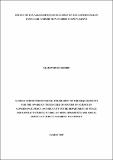Effect of Tax Aggressiveness Practices on Tax Governance in Eastleigh Jurisdiction, Nairobi County, Kenya

View/
Date
2017Author
Odhiambo, Elzeever
Type
ThesisLanguage
enMetadata
Show full item recordAbstract
Developed countries, where Kenya is no exception, need to collect taxes from both individuals and corporates to finance growth and development initiatives, running of day to day expenses of the government, control the Kenyan economy and try to change the financial activities of its people positively. Tax collection should be recognized by the national government as a thin balance between the authority and individual rights thus the responsibility is to ensure tax payers are treated fairly and their taxes utilized properly. Kenya has made commendable strides in improving tax collection and assessing tax aggressiveness practices, however this has not been fully effected as tax evasion and tax avoidance remains a challenge evidenced with the consistent budget deficits. This paper sought to address the effects of tax aggressiveness practices on tax governance in Kenya. This research paper used resources such as books, journals and online articles to determine the effects of tax aggressiveness practices in relation to good governance. The study used the correlational descriptive survey design with a target population of 2872 registered tax payers in the Eastleigh area, however a sample size of 339 registered tax payers was used. The researcher used quantitative methods to quantify the problem by way of generating numerical data. A regression analysis was used to identify the effect of tax aggressiveness practices on tax governance. From the regression model, the study found out that there were factors influencing tax governance in Kenya, which are total tax evasions and tax avoidance. They either influenced it positively or negatively. The study found out that the intercept was 0.861 for all years. The three independent variables that were studied (tax evasion, tax avoidance and combined tax aggressiveness practices) explain a substantial 74.2% of tax governance in Kenya with equity as represented by adjusted R2 (0.742). The study established that the coefficient for total tax aggressiveness practices was -0.728, meaning that total tax evasion negatively but significantly influenced the tax governance in Kenya. The study therefore concluded that tax aggressiveness practices negatively but significantly affects tax governance in Kenya. The study recommended that due to the potential negative effects of tax aggressiveness practices on tax governance in Kenya, new policy guidelines contained in the budget speeches and other tax policy documents should be implemented, as a matter of urgency, almost immediately.
Publisher
Africa Nazarene University
